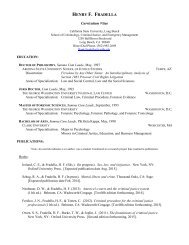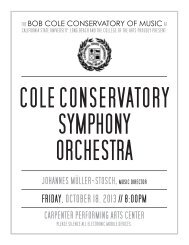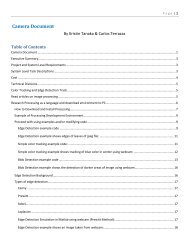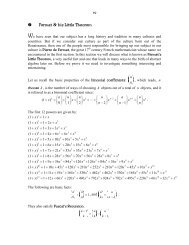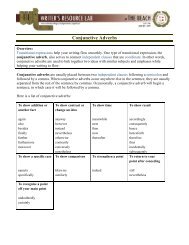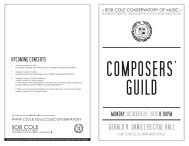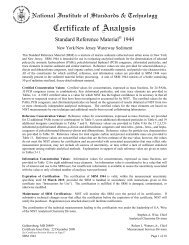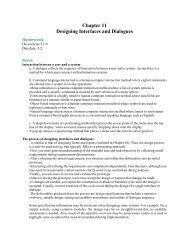Untitled - California State University, Long Beach
Untitled - California State University, Long Beach
Untitled - California State University, Long Beach
You also want an ePaper? Increase the reach of your titles
YUMPU automatically turns print PDFs into web optimized ePapers that Google loves.
with distant “others” is our privileging of one or two “concentric circles” of<br />
obligations and commitments that we have made locally, to our families<br />
and neighbors, for the “widest circle” of all: humanity (Fischer 53).<br />
Therefore, it is not necessarily a battle for supremacy over basic values, e.g.<br />
western democracy versus Islamic fundamentalism, as much as those who<br />
have exploited nationalist and nativist sentiment would like us to believe<br />
it is. If we cannot necessarily transcend the so-called local agreements<br />
that keep us apart globally, we can at least reach some agreement over the<br />
values we do share. But such empathy and understanding for one another<br />
must be won rhetorically.<br />
Let us return to Anson’s island scenario and imagine things a bit<br />
differently. Something has happened on the island recently or in the not<br />
too distant past (it doesn’t matter exactly when) and the inhabitants are<br />
asked how to judge this event, to decide whether whatever occurred was<br />
“cruel” or “just,” and what to do about it. Along with canonical knowledge<br />
in their metaphorical suitcases, the inhabitants have all brought a set of<br />
moral and ethical criteria in which to judge a situation or event. While in<br />
Anson’s original scenario, the process of negotiating and building a canon<br />
of knowledge went rather smoothly, here, the situation is tenser. What<br />
kind of new “golden rule,” baseline language for evaluating and making<br />
ethical decisions, could these newly arriving inhabitants share without<br />
some insisting their judgments are more valid than others’?<br />
In all likelihood, the island inhabitants would be unable to reach<br />
an agreement over how to ethically judge an affair—especially if new<br />
inhabitants with new perspectives and prejudices continue to arrive.<br />
But what they will do, and this is what Appiah’s theory of rooted<br />
cosmopolitanism rests upon, is “[getting] used to each other.” As he<br />
explains:<br />
I am urging that we should learn about people in other<br />
places, take an interest in their civilizations, their arguments,<br />
10 | Olague<br />
their errors, their achievements, not because they will bring<br />
us to agreement, but because it will help us get used to one<br />
another. If that is the aim, then the fact that we have all these<br />
opportunities for disagreement about values need not put us<br />
off. Understanding one another may be hard: it can certainly be<br />
interesting. But it doesn’t require that we come to agreement.<br />
(Appiah 78, emphasis added)<br />
If it is impossible or virtually impossible to ever agree on universal<br />
values how does sophistic rhetoric help us “get used to” each other? The<br />
answer, it appears, is through the imagination. But it is a concept of the<br />
imagination that is built upon three neo-pragmatic rhetorical concepts:<br />
Burkean “identification” and “transformation,” Rorty’s liberal ironist hope<br />
for a “contingent (global) community,” and the ever-expanding notion of<br />
Fish’s “interpretive community” of rhetorically self-aware readers.<br />
One of the critiques of the sophists is that their endless undercutting<br />
of logical propositions and claims of truth do not provide much help<br />
when urgent decisions have to be made. This is the same charge made<br />
against the postmodernists, that their rejection of universal values and<br />
absolute truth provide no ground to make urgent ethical decisions. If<br />
something is always right and wrong at the same time, how then do we<br />
know when and how to judge a given situation? It would be reactionary<br />
to implicate sophistry and its postmodern variety with nihilism and<br />
vulgar cultural relativism, those who would answer every political crisis<br />
with “why worry?” or “that’s just how they do things down there.” By<br />
extension, returning to the notion that either reason alone or religious<br />
authority can provide a basis for universal values is also not possible or<br />
desirable either. This is where people like Burke, Rorty, and Fish seem to<br />
coalesce around a modern “sophist” figure like Nietzsche and his call for a<br />
“dramatization” of truth—an expressive representation of human fears and<br />
desires that lead to self-knowledge and community engagement. Hence,<br />
Olague | 11



